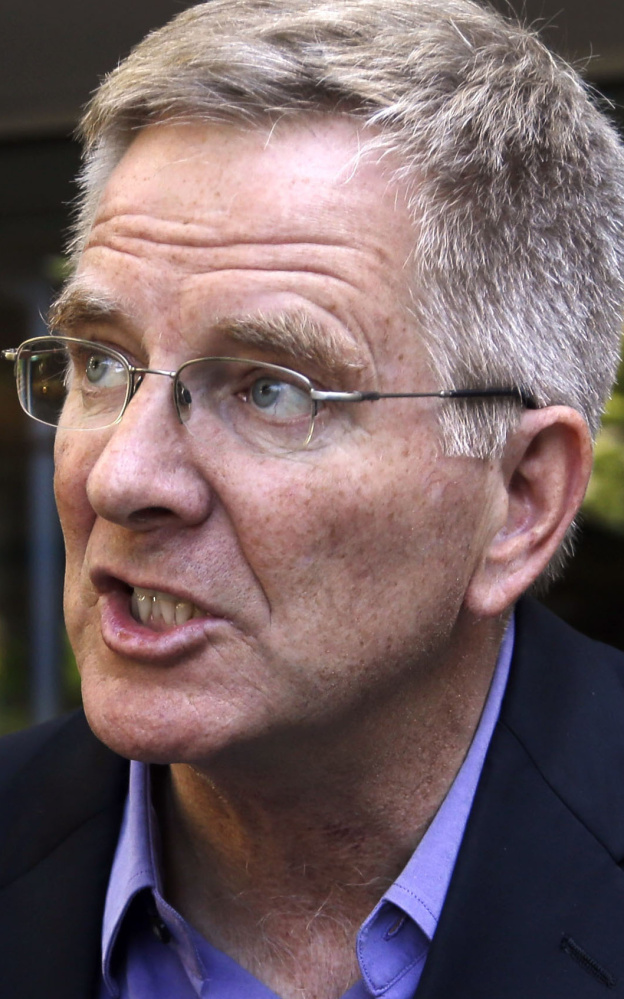A group fighting the legalization of marijuana in Maine on Friday challenged travel writer and entrepreneur Rick Steves to a debate.
Steves, a legalization advocate, made a $50,000 donation to the Campaign to Regulate Marijuana Like Alcohol this month and has said he would visit Maine in October to support the campaign.
On Friday, the director of Smart Approaches to Marijuana Maine, a group that’s opposing legalization, proposed a debate between Steves and Dr. Kevin Sabet, a former drug policy adviser for Presidents Clinton, George W. Bush and Obama. Sabet served in the White House Office of National Drug Control Policy, also known as the drug czar’s office.
“If we are going to bring national folks here to talk about marijuana, we are happy to bring our own so we can have the opportunity to debate this important issue,” Scott Gagnon said.
Sabet, who is the national director of Smart Approaches to Marijuana, has been a close adviser to the emerging “No” campaign, Mainers Protecting Our Youth and Our Community.
“Since the Maine initiative would legalize pot candies, pot bars, and pot advertising, the stakes are too high to ignore,” Sabet said in a statement provided Friday to the Portland Press Herald. “We would welcome an open debate about this very serious issue.”
“As a drug policy adviser to three presidential administrations, Dr. Sabet has seen firsthand the ravages of addiction on youth, especially addiction fueled by drug industries,” Gagnon said. “He has been the national leader in raising the awareness of the threats marijuana poses to youth and communities. Our campaign is humbled and honored for his willingness to bring his expertise and represent our concerns in an open debate.”
It was unclear if Steves would agree to the debate or not. A spokeswoman for him said by email Friday that he was unavailable for comment as he was working in Europe. A message sent through Steves’ Twitter account also went unanswered on Friday.
David Boyer, director of the Campaign to Regulate Marijuana Like Alcohol, said Friday he would work with Gagnon to set up a debate in Maine with Sabet. Boyer said the date and the participants would be announced soon.
“Through my travels in Europe, I’ve learned that pragmatic harm reduction makes much more sense than legislating morality,” Steves wrote in a letter in May to the pro-legalization campaign in Maine. “And I believe in civil liberties. Responsible adults should be able to use marijuana, just as they can use alcohol. Washington, Oregon, Colorado and Alaska have demonstrated that it is possible to build a system of marijuana control and regulation that works. This isn’t about being ‘soft’ or ‘hard’ on drugs. This is about being smart – and controlling and regulating marijuana the right way.”
In 2015, Sabet participated in a Yale University debate with legalization advocate and former New Mexico Gov. Gary Johnson, the Libertarian Party’s candidate for president.
“Legalization is about one word,” Sabet said in that debate. “It is not about civil liberties. It is not about getting rid of the war on drugs. It is about money. Legalization is about making money and it is frankly about that, just like it has been about that for the alcohol and tobacco industries.”
Gagnon said his organization is forming a new political action committee and that the first financial filings for the PAC would be made within the next few weeks.
If Maine voters decide to legalize recreational marijuana in November, the state would become the fifth in the U.S. to do so, joining Alaska, Colorado, Oregon and Washington. The District of Columbia has also legalized recreational marijuana. The laws in all four states and D.C. are in conflict with U.S. federal law, which still makes the use and possession of marijuana a crime.
In 2013, Portland became the first East Coast city to approve a legalization ordinance. A similar effort in Lewiston, the state’s second largest city, failed in 2014.
If the referendum is approved, adults could possess up to 2½ ounces of marijuana and cultivate up to six plants for personal use. Marijuana use would be prohibited in public, with violations punished by a $100 fine. The bill also would apply a sales tax of 10 percent to retail marijuana and marijuana products.
Medical marijuana use has been legal in Maine since 1999.
Send questions/comments to the editors.




Success. Please wait for the page to reload. If the page does not reload within 5 seconds, please refresh the page.
Enter your email and password to access comments.
Hi, to comment on stories you must . This profile is in addition to your subscription and website login.
Already have a commenting profile? .
Invalid username/password.
Please check your email to confirm and complete your registration.
Only subscribers are eligible to post comments. Please subscribe or login first for digital access. Here’s why.
Use the form below to reset your password. When you've submitted your account email, we will send an email with a reset code.